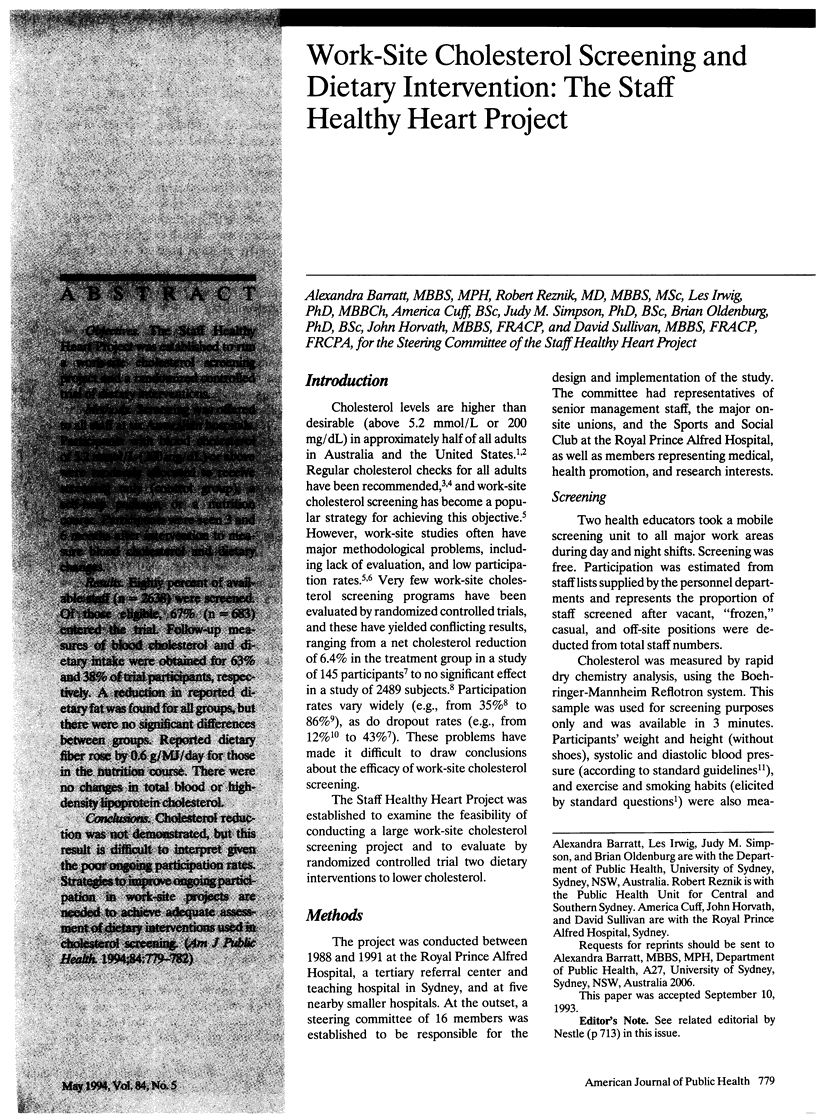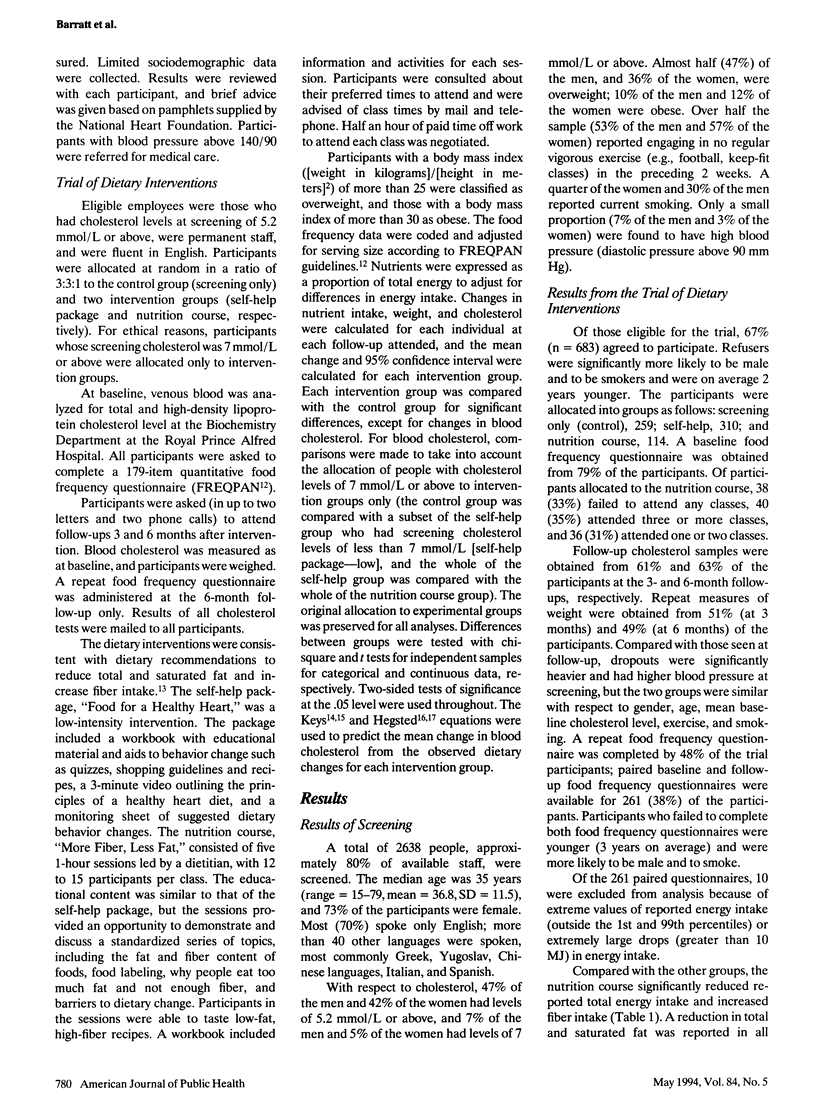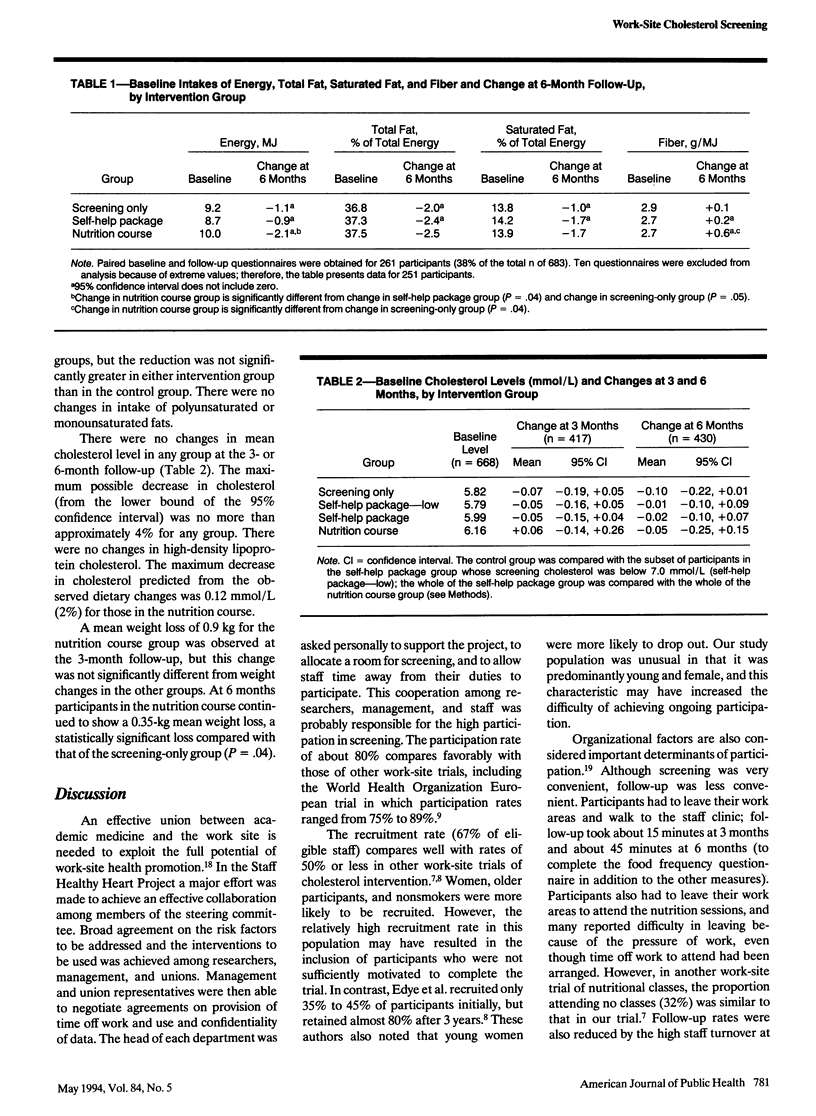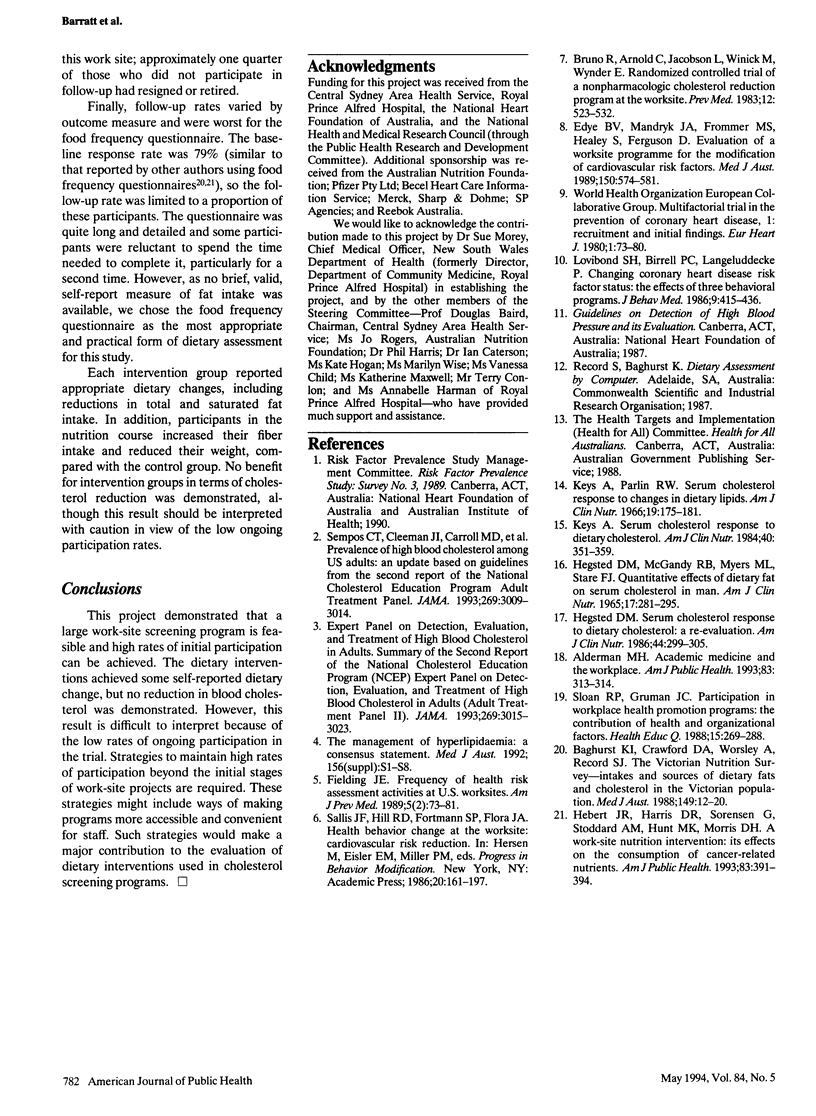Abstract
OBJECTIVES. The Staff Healthy Heart Project was established to run a work-site cholesterol screening project and a randomized controlled trial of dietary interventions. METHODS. Screening was offered to all staff at six Australian hospitals. Participants with blood cholesterol of 5.2 mmol/L (200 mg/dL) or above were randomly allocated to receive screening only (control group), a self-help package, or a nutrition course. Participants were seen 3 and 6 months after intervention to measure blood cholesterol and dietary changes. RESULTS. Eighty percent of available staff (n = 2638) were screened. Of those eligible, 67% (n = 683) entered the trial. Follow-up measures of blood cholesterol and dietary intake were obtained for 63% and 38% of trial participants, respectively. A reduction in reported dietary fat was found for all groups, but there were no significant differences between groups. Reported dietary fiber rose by 0.6 g/MJ/day for those in the nutrition course. There were no changes in total blood or high-density lipoprotein cholesterol. CONCLUSIONS. Cholesterol reduction was not demonstrated, but this result is difficult to interpret given the poor ongoing participation rates. Strategies to improve ongoing participation in work-site projects are needed to achieve adequate assessment of dietary interventions used in cholesterol screening.
Full text
PDF



Selected References
These references are in PubMed. This may not be the complete list of references from this article.
- Alderman M. H. Academic medicine and the workplace. Am J Public Health. 1993 Mar;83(3):313–314. doi: 10.2105/ajph.83.3.313. [DOI] [PMC free article] [PubMed] [Google Scholar]
- Baghurst K. I., Crawford D. A., Worsley A., Record S. J. The Victorian Nutrition Survey--intakes and sources of dietary fats and cholesterol in the Victorian population. Med J Aust. 1988 Jul 4;149(1):12-5, 18-20. doi: 10.5694/j.1326-5377.1988.tb120476.x. [DOI] [PubMed] [Google Scholar]
- Bruno R., Arnold C., Jacobson L., Winick M., Wynder E. Randomized controlled trial of a nonpharmacologic cholesterol reduction program at the worksite. Prev Med. 1983 Jul;12(4):523–532. doi: 10.1016/0091-7435(83)90206-2. [DOI] [PubMed] [Google Scholar]
- Edye B. V., Mandryk J. A., Frommer M. S., Healey S., Ferguson D. A. Evaluation of a worksite programme for the modification of cardiovascular risk factors. Med J Aust. 1989 May 15;150(10):574, 576-8, 581. doi: 10.5694/j.1326-5377.1989.tb136695.x. [DOI] [PubMed] [Google Scholar]
- Fielding J. E. Frequency of health risk assessment activities at U.S. worksites. Am J Prev Med. 1989 Mar-Apr;5(2):73–81. [PubMed] [Google Scholar]
- Hebert J. R., Harris D. R., Sorensen G., Stoddard A. M., Hunt M. K., Morris D. H. A work-site nutrition intervention: its effects on the consumption of cancer-related nutrients. Am J Public Health. 1993 Mar;83(3):391–394. doi: 10.2105/ajph.83.3.391. [DOI] [PMC free article] [PubMed] [Google Scholar]
- Hegsted D. M., McGandy R. B., Myers M. L., Stare F. J. Quantitative effects of dietary fat on serum cholesterol in man. Am J Clin Nutr. 1965 Nov;17(5):281–295. doi: 10.1093/ajcn/17.5.281. [DOI] [PubMed] [Google Scholar]
- Hegsted D. M. Serum-cholesterol response to dietary cholesterol: a re-evaluation. Am J Clin Nutr. 1986 Aug;44(2):299–305. doi: 10.1093/ajcn/44.2.299. [DOI] [PubMed] [Google Scholar]
- Keys A., Parlin R. W. Serum cholesterol response to changes in dietary lipids. Am J Clin Nutr. 1966 Sep;19(3):175–181. doi: 10.1093/ajcn/19.3.175. [DOI] [PubMed] [Google Scholar]
- Keys A. Serum cholesterol response to dietary cholesterol. Am J Clin Nutr. 1984 Aug;40(2):351–359. doi: 10.1093/ajcn/40.2.351. [DOI] [PubMed] [Google Scholar]
- Lovibond S. H., Birrell P. C., Langeluddecke P. Changing coronary heart disease risk-factor status: the effects of three behavioral programs. J Behav Med. 1986 Oct;9(5):415–437. doi: 10.1007/BF00845131. [DOI] [PubMed] [Google Scholar]
- Sempos C. T., Cleeman J. I., Carroll M. D., Johnson C. L., Bachorik P. S., Gordon D. J., Burt V. L., Briefel R. R., Brown C. D., Lippel K. Prevalence of high blood cholesterol among US adults. An update based on guidelines from the second report of the National Cholesterol Education Program Adult Treatment Panel. JAMA. 1993 Jun 16;269(23):3009–3014. doi: 10.1001/jama.269.23.3009. [DOI] [PubMed] [Google Scholar]
- Sloan R. P., Gruman J. C. Participation in workplace health promotion programs: the contribution of health and organizational factors. Health Educ Q. 1988 Fall;15(3):269–288. doi: 10.1177/109019818801500303. [DOI] [PubMed] [Google Scholar]


